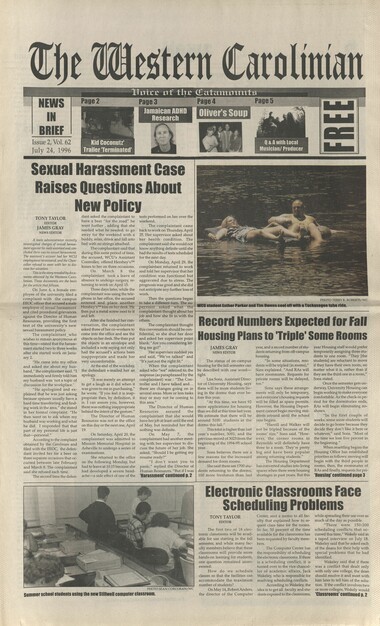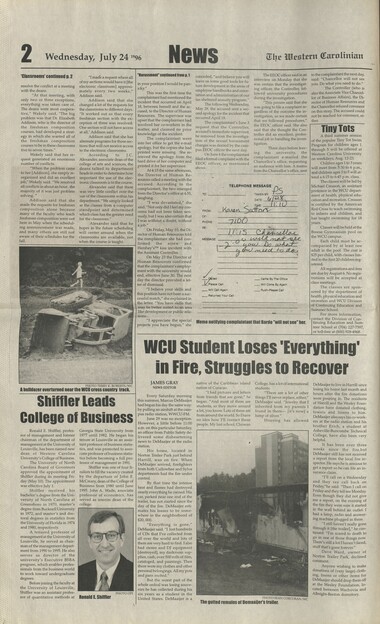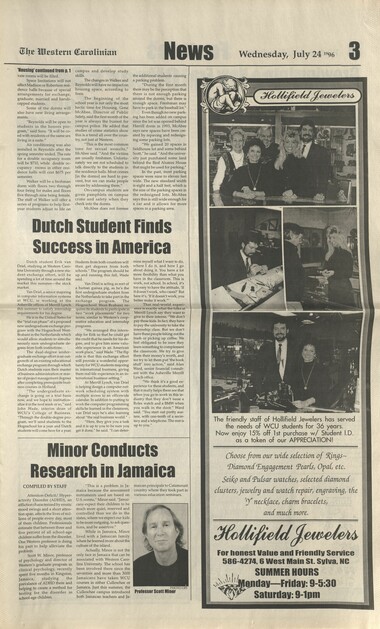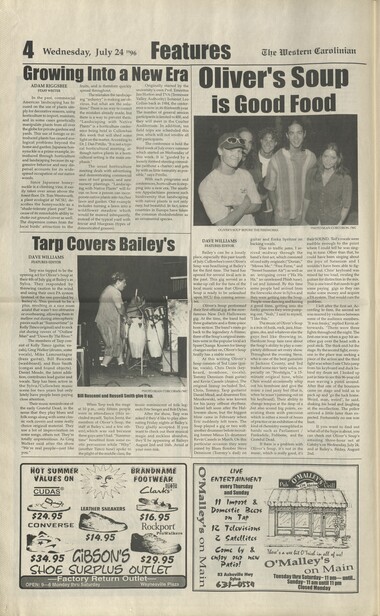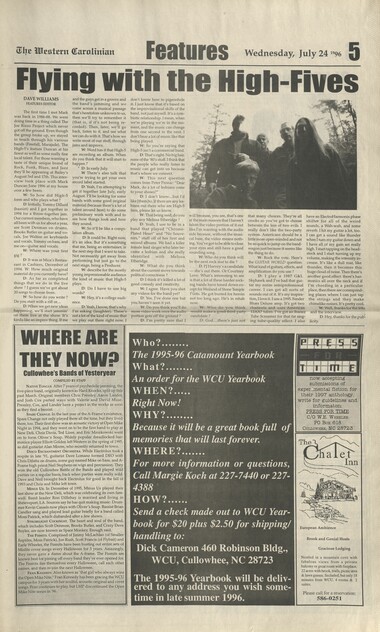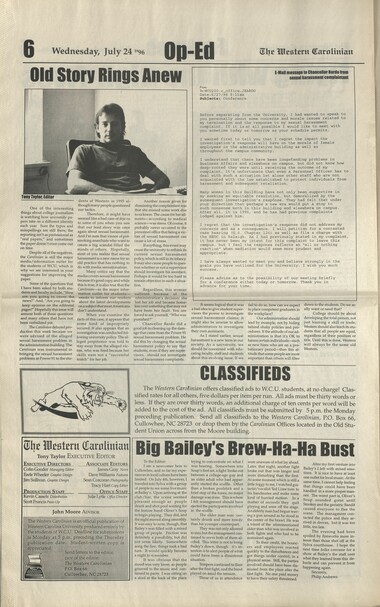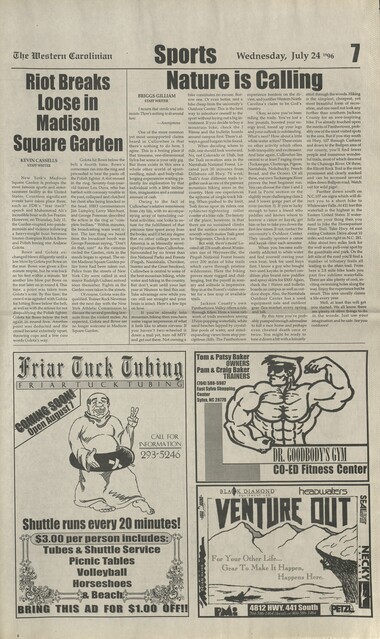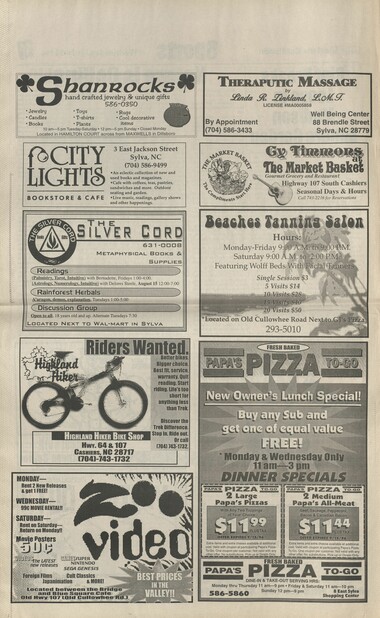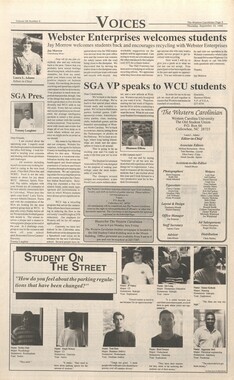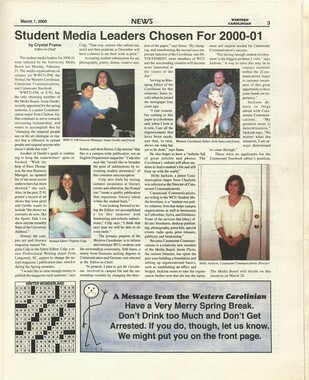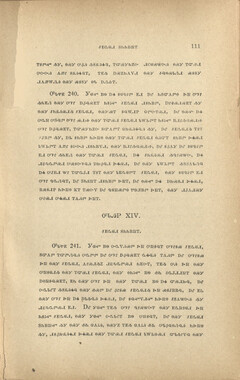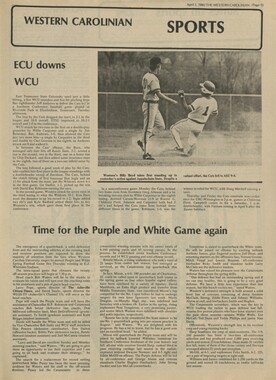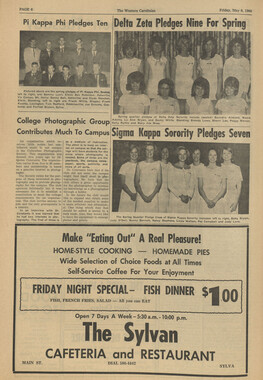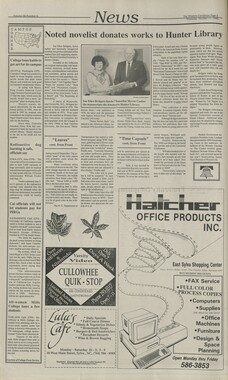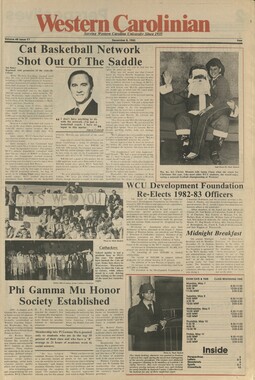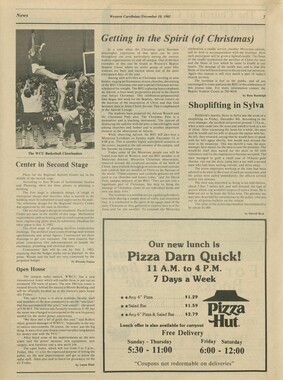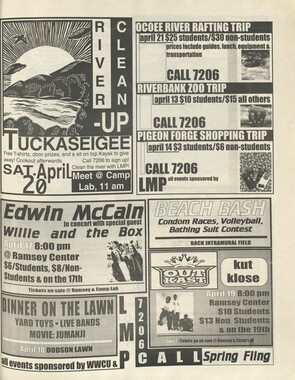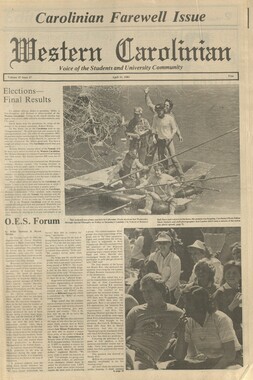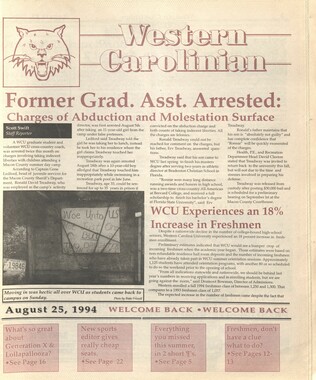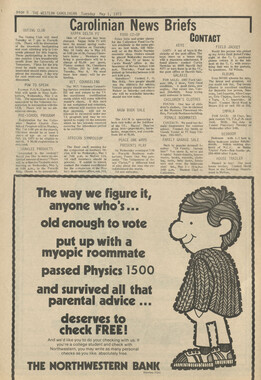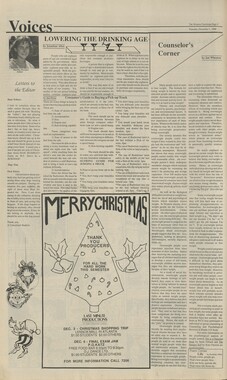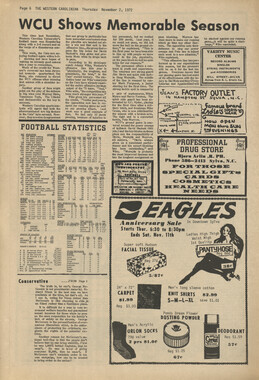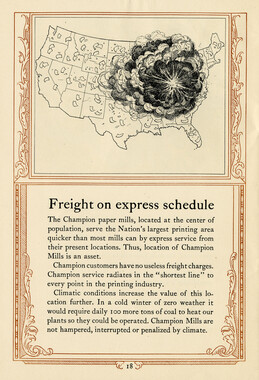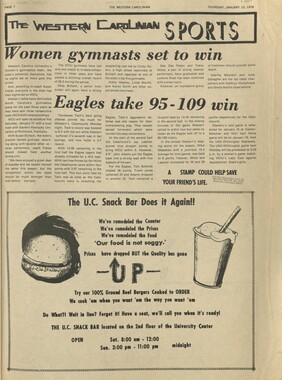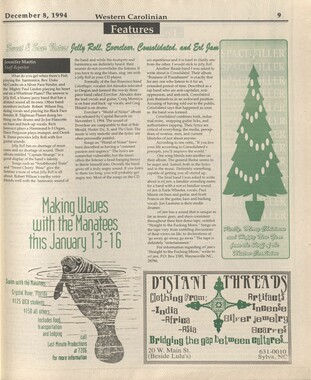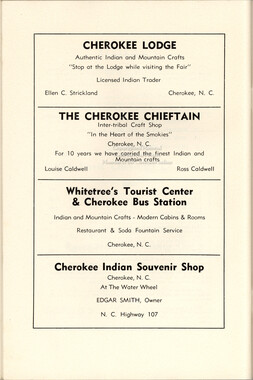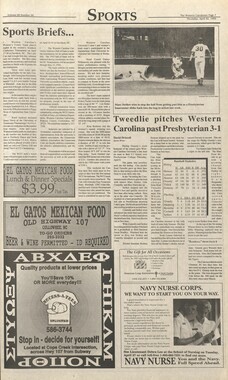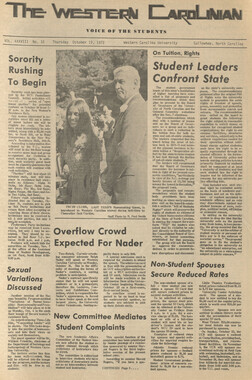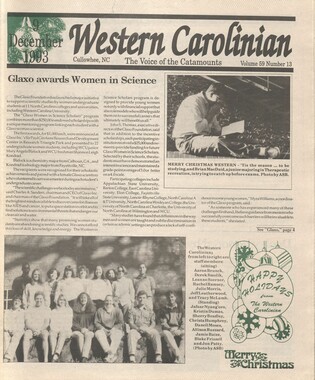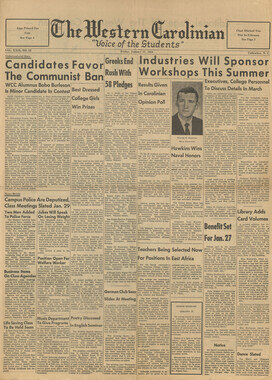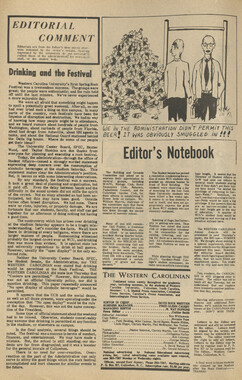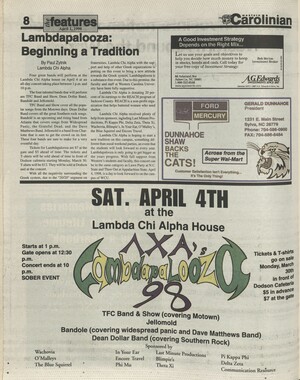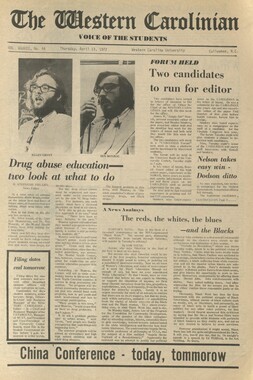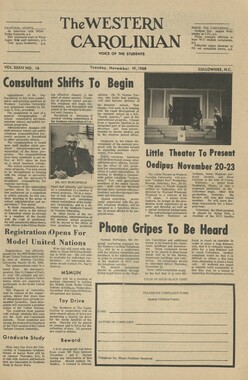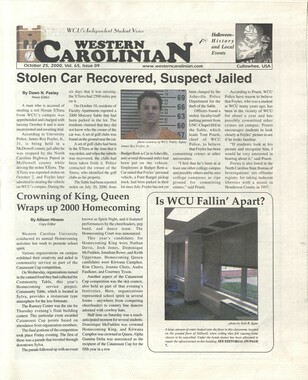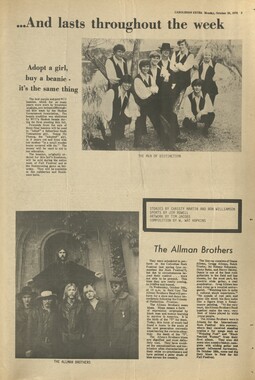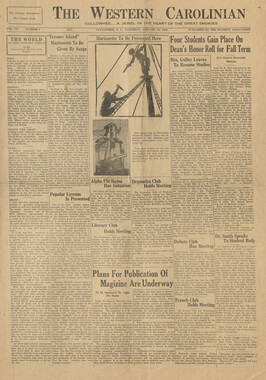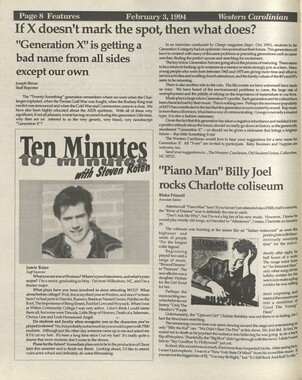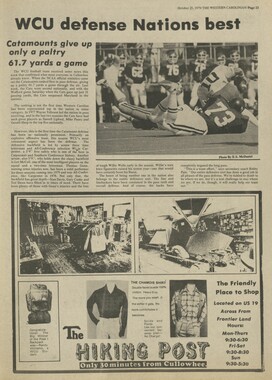Western Carolina University (20)
View all
- Canton Champion Fibre Company (2308)
- Cherokee Traditions (293)
- Civil War in Southern Appalachia (165)
- Craft Revival (1942)
- Great Smoky Mountains - A Park for America (2767)
- Highlights from Western Carolina University (430)
- Horace Kephart (941)
- Journeys Through Jackson (154)
- LGBTQIA+ Archive of Jackson County (24)
- Oral Histories of Western North Carolina (314)
- Picturing Appalachia (6772)
- Stories of Mountain Folk (413)
- Travel Western North Carolina (160)
- Western Carolina University Fine Art Museum Vitreograph Collection (129)
- Western Carolina University Herbarium (92)
- Western Carolina University: Making Memories (708)
- Western Carolina University Publications (2283)
- Western Carolina University Restricted Electronic Theses and Dissertations (146)
- Western North Carolina Regional Maps (71)
- World War II in Southern Appalachia (131)
University of North Carolina Asheville (6)
View all
- Allanstand Cottage Industries (62)
- Appalachian National Park Association (53)
- Bennett, Kelly, 1890-1974 (1388)
- Berry, Walter (76)
- Brasstown Carvers (40)
- Carver, George Washington, 1864?-1943 (26)
- Cathey, Joseph, 1803-1874 (1)
- Champion Fibre Company (233)
- Champion Paper and Fibre Company (297)
- Cherokee Indian Fair Association (16)
- Cherokee Language Program (22)
- Crowe, Amanda (40)
- Edmonston, Thomas Benton, 1842-1907 (7)
- Ensley, A. L. (Abraham Lincoln), 1865-1948 (275)
- Fromer, Irving Rhodes, 1913-1994 (70)
- George Butz (BFS 1907) (46)
- Goodrich, Frances Louisa (120)
- Grant, George Alexander, 1891-1964 (96)
- Heard, Marian Gladys (60)
- Kephart, Calvin, 1883-1969 (15)
- Kephart, Horace, 1862-1931 (313)
- Kephart, Laura, 1862-1954 (39)
- Laney, Gideon Thomas, 1889-1976 (439)
- Masa, George, 1881-1933 (61)
- McElhinney, William Julian, 1896-1953 (44)
- Niggli, Josephina, 1910-1983 (10)
- North Carolina Park Commission (105)
- Osborne, Kezia Stradley (9)
- Owens, Samuel Robert, 1918-1995 (11)
- Penland Weavers and Potters (36)
- Roberts, Vivienne (15)
- Roth, Albert, 1890-1974 (142)
- Schenck, Carl Alwin, 1868-1955 (1)
- Sherrill's Photography Studio (2565)
- Southern Highland Handicraft Guild (127)
- Southern Highlanders, Inc. (71)
- Stalcup, Jesse Bryson (46)
- Stearns, I. K. (213)
- Thompson, James Edward, 1880-1976 (226)
- United States. Indian Arts and Crafts Board (130)
- USFS (683)
- Vance, Zebulon Baird, 1830-1894 (1)
- Weaver, Zebulon, 1872-1948 (58)
- Western Carolina College (230)
- Western Carolina Teachers College (282)
- Western Carolina University (1794)
- Western Carolina University. Mountain Heritage Center (18)
- Whitman, Walt, 1819-1892 (10)
- Wilburn, Hiram Coleman, 1880-1967 (73)
- Williams, Isadora (3)
- Cain, Doreyl Ammons (0)
- Crittenden, Lorraine (0)
- Rhodes, Judy (0)
- Smith, Edward Clark (0)
- Appalachian Region, Southern (2393)
- Asheville (N.C.) (1887)
- Avery County (N.C.) (26)
- Blount County (Tenn.) (161)
- Buncombe County (N.C.) (1664)
- Cherokee County (N.C.) (283)
- Clay County (N.C.) (555)
- Graham County (N.C.) (233)
- Great Smoky Mountains National Park (N.C. and Tenn.) (481)
- Haywood County (N.C.) (3522)
- Henderson County (N.C.) (70)
- Jackson County (N.C.) (4692)
- Knox County (Tenn.) (25)
- Knoxville (Tenn.) (12)
- Lake Santeetlah (N.C.) (10)
- Macon County (N.C.) (420)
- Madison County (N.C.) (211)
- McDowell County (N.C.) (39)
- Mitchell County (N.C.) (132)
- Polk County (N.C.) (35)
- Qualla Boundary (981)
- Rutherford County (N.C.) (76)
- Swain County (N.C.) (2113)
- Transylvania County (N.C.) (247)
- Watauga County (N.C.) (12)
- Waynesville (N.C.) (68)
- Yancey County (N.C.) (72)
- Aerial Photographs (3)
- Aerial Views (60)
- Albums (books) (4)
- Articles (1)
- Artifacts (object Genre) (228)
- Biography (general Genre) (2)
- Cards (information Artifacts) (38)
- Clippings (information Artifacts) (191)
- Crafts (art Genres) (622)
- Depictions (visual Works) (21)
- Design Drawings (1)
- Drawings (visual Works) (184)
- Envelopes (73)
- Facsimiles (reproductions) (1)
- Fiction (general Genre) (4)
- Financial Records (12)
- Fliers (printed Matter) (67)
- Glass Plate Negatives (381)
- Guidebooks (2)
- Internegatives (10)
- Interviews (811)
- Land Surveys (102)
- Letters (correspondence) (1013)
- Manuscripts (documents) (619)
- Maps (documents) (159)
- Memorandums (25)
- Minutes (administrative Records) (59)
- Negatives (photographs) (5835)
- Newsletters (1285)
- Newspapers (2)
- Occupation Currency (1)
- Paintings (visual Works) (1)
- Pen And Ink Drawings (1)
- Periodicals (193)
- Personal Narratives (7)
- Photographs (12975)
- Plans (maps) (1)
- Poetry (6)
- Portraits (1663)
- Postcards (329)
- Programs (documents) (151)
- Publications (documents) (2237)
- Questionnaires (65)
- Scrapbooks (282)
- Sheet Music (1)
- Slides (photographs) (402)
- Sound Recordings (796)
- Specimens (92)
- Speeches (documents) (15)
- Tintypes (photographs) (8)
- Transcripts (322)
- Video Recordings (physical Artifacts) (23)
- Vitreographs (129)
- Text Messages (0)
- A.L. Ensley Collection (275)
- Appalachian Industrial School Records (7)
- Appalachian National Park Association Records (336)
- Axley-Meroney Collection (2)
- Bayard Wootten Photograph Collection (20)
- Bethel Rural Community Organization Collection (7)
- Blumer Collection (5)
- C.W. Slagle Collection (20)
- Canton Area Historical Museum (2110)
- Carlos C. Campbell Collection (282)
- Cataloochee History Project (65)
- Cherokee Studies Collection (4)
- Daisy Dame Photograph Album (5)
- Daniel Boone VI Collection (1)
- Doris Ulmann Photograph Collection (112)
- Elizabeth H. Lasley Collection (1)
- Elizabeth Woolworth Szold Fleharty Collection (4)
- Frank Fry Collection (95)
- George Masa Collection (173)
- Gideon Laney Collection (452)
- Hazel Scarborough Collection (2)
- Hiram C. Wilburn Papers (28)
- Historic Photographs Collection (236)
- Horace Kephart Collection (861)
- Humbard Collection (33)
- Hunter and Weaver Families Collection (1)
- I. D. Blumenthal Collection (4)
- Isadora Williams Collection (4)
- Jesse Bryson Stalcup Collection (47)
- Jim Thompson Collection (224)
- John B. Battle Collection (7)
- John C. Campbell Folk School Records (80)
- John Parris Collection (6)
- Judaculla Rock project (2)
- Kelly Bennett Collection (1407)
- Love Family Papers (11)
- Major Wiley Parris Civil War Letters (3)
- Map Collection (12)
- McFee-Misemer Civil War Letters (34)
- Mountain Heritage Center Collection (4)
- Norburn - Robertson - Thomson Families Collection (44)
- Pauline Hood Collection (7)
- Pre-Guild Collection (2)
- Qualla Arts and Crafts Mutual Collection (12)
- R.A. Romanes Collection (681)
- Rosser H. Taylor Collection (1)
- Samuel Robert Owens Collection (94)
- Sara Madison Collection (144)
- Sherrill Studio Photo Collection (2558)
- Smoky Mountains Hiking Club Collection (616)
- Stories of Mountain Folk - Radio Programs (374)
- The Reporter, Western Carolina University (510)
- Venoy and Elizabeth Reed Collection (16)
- WCU Gender and Sexuality Oral History Project (32)
- WCU Mountain Heritage Center Oral Histories (25)
- WCU Oral History Collection - Mountain People, Mountain Lives (71)
- WCU Students Newspapers Collection (1744)
- Western North Carolina Tomorrow Black Oral History Project (69)
- William Williams Stringfield Collection (2)
- Zebulon Weaver Collection (109)
- African Americans (390)
- Appalachian Trail (35)
- Artisans (521)
- Cherokee art (84)
- Cherokee artists -- North Carolina (10)
- Cherokee language (21)
- Cherokee pottery (101)
- Cherokee women (208)
- Church buildings (167)
- Civilian Conservation Corps (U.S.) (110)
- College student newspapers and periodicals (1830)
- Dams (103)
- Dance (1023)
- Education (222)
- Floods (61)
- Folk music (1015)
- Forced removal, 1813-1903 (2)
- Forest conservation (220)
- Forests and forestry (917)
- Gender nonconformity (4)
- Great Smoky Mountains National Park (N.C. and Tenn.) (159)
- Hunting (38)
- Landscape photography (10)
- Logging (103)
- Maps (84)
- Mines and mineral resources (8)
- North Carolina -- Maps (18)
- Paper industry (38)
- Postcards (255)
- Pottery (135)
- Railroad trains (71)
- Rural electrification -- North Carolina, Western (3)
- School integration -- Southern States (2)
- Segregation -- North Carolina, Western (5)
- Slavery (5)
- Sports (452)
- Storytelling (245)
- Waterfalls -- Great Smoky Mountains (N.C. and Tenn.) (66)
- Weaving -- Appalachian Region, Southern (280)
- Wood-carving -- Appalachian Region, Southern (328)
- World War, 1939-1945 (173)
Western Carolinian Volume 62 Number 02
Item
Item’s are ‘child’ level descriptions to ‘parent’ objects, (e.g. one page of a whole book).
-
-
the extern Caro linian 0tr0 of the (Eatammmta NEWS BRIEF Issue 2, Vol. 62 July 24, 1996 Page 2 Page 4 Page 3 *S2ST Leer's Soup Page 5 Kid Coconutz" Trailer Terminated' Sexual Harassment Case Raises Questions About New Policy TONY TAYLOR EDITOR JAMES GRAY NEWS EDITOR A male administrator recently investigated charges of sexual harassment against his male assistant and concluded there was no sexual harassment. The assistant's accuser had her WCU employment terminated, and the Chancellor refused to meet with her to discuss her situation. This is the story revealed by documents obtained by the Western Carolinian. Those documents are the basis for the article that follows. On June 4, a female employee of the university filed a complaint with the campus EEOC officer that accused a male employee of sexual harassment and cited procedural grievances against the Director of Human Resources, providing the first test of the university's new sexual harassment policy. The complaintant_who wishes to remain anonymous at this time—stated that the harassment started two to three weeks after she started work on January 2. "He came into my office and asked me about my husband," the complaintant said. "I immediately and firmly told him my husband was 'not a topic of discussion for the workplace.' "He apologized and explained that he was just asking because spouses usually have a hard time transferring and finding work in the area," she stated in her formal complaint. "He then went on to ask where my husband was working and what he did. I responded that that part of my personal life is just that—personal." According to the complaint obtained by the Carolinian and filed with the EEOC, the defendant invited her for a beer on three separate occasions that occurred between late February and March 8. The complaintant said she refused each time. The second time the defen dant asked the complaintant to have a beer "for the road" he went further , adding that she needed what he needed: to go away for the weekend with a buddy, relax, drink and fall into bed with no strings attached. The complaintant said that during this same period of time, the accused, WCU's Assistant Controller, offered Hershey's™ kisses to her on three occasions. On March 8 the complaintant took a leave of absence to undergo surgery, returning to work on April 15. Three days later, while the complaintant was using the telephone in her office, the accused entered and place another Hershey's™ kiss on her desk. He then put a metal screw next to it and left. After she finished her conversation, the complaintant asked three of her co-workers to come into the office and see the objects on her desk. She then put the objects in an envelope and included a note saying not only had the accused's actions been inappropriate and made her very uncomfortable. At the end of the workday, the defendant e-mailed her an apology. "It was merely an attempt to get a laugh as it did when it was given to me in purchasing," he wrote. "If you feel it is inappropriate then, by definition, it is. I can assure you, however, there was nothing inappropriate behind the intent of the gesture." The Director of Human Resources was not in the office on this day or the next one, April 19. On Saturday, April 20, the complaintant was admitted to Mission Memorial Hospital in Asheville to undergo a series of examinations. She returned to the office on the following Monday, but had to leave at 10:15 because she had developed a severe headache—a side effect of one of the tests performed on her over the weekend. The complaintant came back to work on Thursday, April 25. Her supervisor asked about her health condition. The complaintant said she would not know anything definite until she had the results of tests scheduled for the next day. On Monday, April 29, the complaintant returned to work and told her supervisor that her condition was functional but aggravated due to stress. The prognosis was good and she did not anticipate any further loss of work. Then the questions began to take a different turn. The supervisor asked what the complaintant thought about her job and how she fit in with the others. The complaintant thought this conversation should be confidential, so she shut her door and asked her supervisor point blank: "Are you considering letting me go?" Her supervisor nodded yes and said, "We've talked" and "It's just not the right fit." When the complaintant asked who "we" referred to, the response (as paraphrased by the complaintant) was : "The Controller and I have talked and... there are changes going on in several areas. More or less tasks may or may not be coming to this area." The Director of Human Resources assured the complaintant that she would have her job at least until the end of May, but reminded her that nothing was definite. On May 7, the complaintant had another meeting with her supervisor to discuss the future of her job. She asked, "Should I be getting my resume ready?" "I don't want you to panic," replied the Director of Human Resources. "But if I was 'Harassment' continued p. 2 PHOTO TERRY K. RO: WCU student Esther Parker and Tim Owens cool off with a Tuckasegee tuhe ride. WC Record Numbers Expected for Fall Housing Plans to 'Triple' Some Rooms JAMES GRAY NEWS EDITOR The status of on-campus housing for the fall semester can be described with one word- tight. Lisa Sons, Assistant Director of University Housing, says there will be more students living in the dorms than ever before this year. "At this time, we have 92 more applications for housing than we did at this time last year. We estimate that there will be around 3100 students in the dorms this fall." This total is higher than last year's number, 3001, and the previous record of 3023 from the beginning of the 1994-95 school year. Sons believes there are a few reasons for the increased demand for dorm rooms. She said there are 1700 students returning to the dorms, 100 more freshmen than last year, and a record number of students returning from off-campus housing. "In some situations, residents will be tripled (in rooms)," Sons explained. "And RAs will have roommates. Requests for private rooms will be delayed, too." Sons says these arrangements will only be temporary, and everyone's housing requests will be filled as space permits. However, the Housing Department cannot begin moving residents around until the school year begins. "Harrill and Walker will not be tripled because of the rooms' size," Sons said. "However, the corner rooms in Reynolds will definitely have three to a room. They're pretty big and have been popular among returning students." The Housing Department has converted studies into living spaces when there were housing shortages in past years. But this year Housing staff would prefer temporarily assigning three students to one room. "They [the students] are reluctant to move if they have their own room, no matter what it is, rather than if they are the third one in a room," ■ Sons stated. Once the semester gets underway, University Housing can begin working to make everyone comfortable. As the check-in period for the dormitories ends, RAs will begin eliminating no- shows. "In the first couple of weeks, some more students will decide to go home because they decide they don't like it here or whatever," said Sons. "Most of the time we lose five percent in the beginning." When resettling begins the Housing Office has established priorities as follows: moving will begin with the third people in rooms, then, the roommates of RAs and finally, requests for pri- 'Housing' continued page 3 Electronic Classrooms Face Scheduling Problems M PHOTO SEAN CORCORAN/WC Summer school students using the new Stillwell computer classroom. TONY TAYLOR EDITOR The first two of 18 electronic classrooms will be available for use starting in the fall semester, and while many faculty members believe that these classrooms will provide more hands-on learning for students, one question remained unanswered: How do we schedule classes so that the facilities can accommodate the maximum number of students? On May 14, Robert Anders, the director of the Computer Center, sent a memo to all faculty that explained how to request class time for the rooms. So far, 50 percent of the time available for the classrooms has been requested by faculty members. The Computer Center has the responsibility of scheduling the electronic classrooms. If there is a scheduling conflict, it is turned over to the vice chancellor of academic affairs, Jack Wakeley, who is responsible for resolving scheduling conflicts. According to Wakeley, the idea is to get all faculty and students exposed to the classrooms, while spreading their use over as much of the day as possible. "There were 150-200 scheduling conflicts that occurred this time," Wakely said in a taped.interview on July 18. Wakeley said that he asked each of the deans for their help with special problems that he had identified. Wakeley said that if there was a conflict that dealt only with only one college, the dean should resolve it and meet with him later to tell him of the solution. If the conflict involves two or more colleges, Wakely would 'Classrooms' continued p. 2
Object
Object’s are ‘parent’ level descriptions to ‘children’ items, (e.g. a book with pages).
-
The Western Carolinian is Western Carolina University's student-run newspaper. The paper was published as the Cullowhee Yodel from 1924 to 1931 before changing its name to The Western Carolinian in 1933.
-
